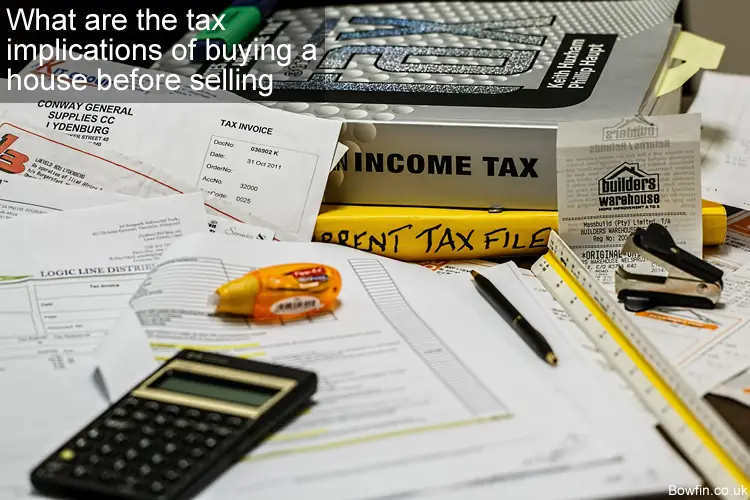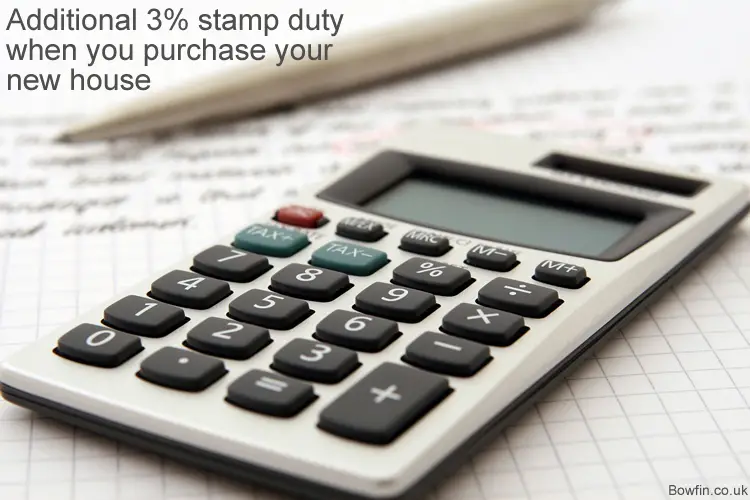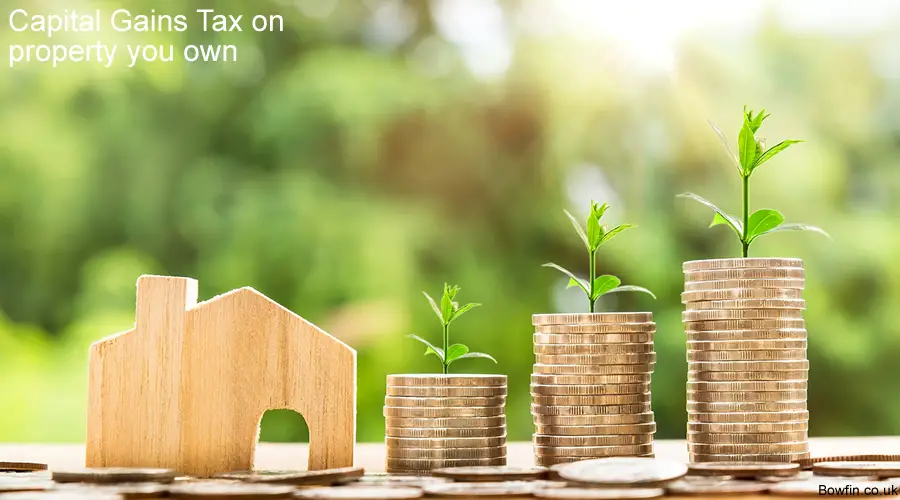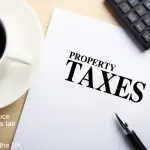
Keeping your old home and buying a new one used to be a good idea. But with recent changes to legislation this has become less advantageous from a tax perspective. This article takes a look at the tax implications of buying a house before selling your old home.
What are the tax implications of buying a house before selling? The tax implications of buying a house before selling include Capital Gains Tax because your old house will no longer include Private Residence Relief. You’ll pay Income Tax on any rent net of expenses if you become a landlord. You’ll pay an extra 3% Stamp Duty on the new house as well as the standard Stamp Duty rates.
But before we look at these tax implications, let’s take a look at why you might want to buy before selling.
Please also read this article to discover how you could save £71,475 on your next mortgage if you sell your house and rent before buying again. Even I was amazed when I did the calculations!
Why buy a house before selling your existing home?
There are many reasons why you may be looking at buying before you sell. These are a few of the reasons this may be the case:
- Wanting to keep an investment to create an income and to be part of your future retirement income.
- You are having difficulty selling your home due to a slow or depressed property market. You may have found the perfect property to move to, but the slow sale of your old house could prevent your new purchase.
- You’ve found a property you want to buy where being in a chain will hinder the purchase. Sellers like buyers who are able to move quickly.
- Your existing house may be in negative equity, which means if you sell it you’d crystallise what you owe to the mortgage company in excess of what its worth.
- The new house you’re buying is a second home in the country or near to the sea. That means this second house is your holiday home.
What are the taxes you might have to pay if you buy another house before you sell your home?
Now let’s take a look at the tax implications of keeping your existing house when you buy another.
You pay additional 3% stamp duty when you purchase a second house

For people who own more than one house, the UK government have imposed a stamp duty penalty. This means that if you don’t sell your existing home before you buy a new house, you will have to pay an additional 3% Stamp Duty (SDLT) on the purchase.
This 3% additional stamp duty is over and above the normal stamp duty rates. For example, let’s say your new home is going to cost you £300,000 to buy.
If you were to sell your existing house, the stamp duty you’d pay would be £5,000. But if you don’t sell your existing house, the stamp duty would become £14,000 instead.
That’s a whopping £9,000 increase in tax. Thank you government!
Application for a stamp duty refund
If however, there’s simply a delay in selling your existing house due to a slow or depressed market, you will be able to apply for a refund of this additional stamp duty.
The time period in which you can apply for a refund is within 3 years of buying your new home.
If you’ve paid the higher amount of SDLT above the normal Stamp Duty rates, you’ll be able to claim a refund as follows:
- If you sell your previous main residence within three years, and
- You claim your refund within three months of the sale of your previous main residence. or you must claim within 12 months of the filing date of your SDLT tax return, whichever comes later.
This means you could rent your previous main residence to tenants for a couple of years to allow the market to pick up. You can then sell it in a better market and reclaim the extra Stamp Duty paid.
Capital Gains Tax on property you own

If you own just one property that you live in, you will not pay any Capital Gains Tax (CGT) when you sell it. This is because the UK government allow for Private Residence Relief on your only or main residence.
The rules around Private Residence Relief apply as follows:
- That you have one home and you’ve lived in it as your main home for all the time you’ve owned it.
- You have not let part of it out – this does not include having a single lodger.
- You have not used part of it for business only.
- The grounds, including all buildings, are less than 5,000 square metres (just over an acre) in total.*
- You did not buy it just to make a gain.
* Houses with larger gardens and grounds may qualify for Private Residence Relief, but only if they are appropriate to the size and character of the property and are required for the reasonable enjoyment of it. If the taxpayer sells a house where the total site exceeds 5,000 square metres HMRC should be notified. In cases of a dispute, the District Valuer will be asked to determine the size and location of the permitted area.
What about if you keep your existing house and rent it to tenants?
The above Capital Gains Tax rules are all well and good when you own just one property. But what if you don’t sell your existing home when you buy a new house. In this case you may have to pay some Capital Gains Tax.
But this scenario can get a bit complex. I’m not going to go into detail on how CGT works in this article. But I suggest that if you are intending to buy a second home and become a landlord, you need to take professional tax advice.
The CGT liability you may incur would only crystallise at the point you sell your previous home in the future.
But in any event, CGT is only ever paid on the difference between what you sell it for and what you paid for the property in the first place. You only pay CGT when there is a profit too.
More Reading: How to reduce capital gains tax on sale of investment property in the UK
Income tax liability on rental income if you become a landlord
The final tax implication of buying a house before selling your existing house is Income Tax. This is certainly the case if you decide to rent your previous home to tenants.
You’ll pay income tax on your rents, less legitimate expenses for renting your house to tenants. This will include repairs and maintenance, insurance, letting agent fees and other costs associated with letting.
Before the tenant tax was introduced, previously you were also able to deduct interest payments too. But this is where you may come unstuck with the current income tax rules around rental income for individuals.
If you are a basic rate tax payer this made no difference, as you get a 20% deduction of the amount of interest paid. But if you are a higher rate tax payer, this will mean your tax liability will be higher than you’d expect.
The UK government in their stupidity brought in a rule that disallows interest as an expense. The implication of this is that you’ll effectively be paying income tax on your interest payments.
This new rule is covered by Section 24 of the taxes act, before which interest was a deductible expense.
The only viable solution to this problem is to rent the house out through a limited company.
But the problem is in getting your existing house into a limited company, as this will attract at the very least Stamp Duty.
Once again I suggest you seek profession tax advice on this matter, as the benefits associated with retaining your existing house to buy a new one may be outweighed by this huge disadvantage.
If you want to seek professional tax advice from a property landlord specialist, try Property 118. Here’s a testimonial from a happy customer of Property118:
“After a gruelling 3 year divorce I was left with 15 properties, 17 year old twins to support through University and the prospect of Section 24 on the horizon.
Testimonial on Prioperty118.com; read JB’s full review here from a property landlord taking advance of Section 24 tax advice.
I had read about Mark Alexander’s spectacular success in fighting West Brom and winning £27 million in repayments to landlords who had been overcharged. It was a truly magnificent result and benefited every landlord in the country who has a tracker mortgage.
I knew I needed help to restructure so decided to invest in a consultation with Mark. This was an excellent decision. Mark grasped my situation quickly, knew what questions to ask and is knowledgeable on the landlords ultimate trinity of property, finance and law.
My twins are now 18 and I have formed a partnership with them. I can choose how much profit to allocate to them to utilise their zero/basic rate tax band and keep myself in the basic rate tax band. In 3 years time I will be able to incorporate the partnership WITHOUT needing to refinance, WITHOUT paying SDLT and WITHOUT paying CGT. Magic!“
How does buying and selling a house affect your tax return?
Generally speaking when you buy and sell a house that’s your principle private residence (PPR) this doesn’t affect your tax return. That’s because your PPR is exempt of tax when you sell.
But if don’t sell you current home immediately and rent it to tenants, you’ll need to include the rental income on your tax return.
Additionally, if you turn your current home into a buy to let investment, when you finally come to sell it you’ll need to include this sale on your tax return in the Capital gains section.
How to buy a house before selling yours?
To buy a house before selling yours you may need to use some of the equity in your current house to use as a deposit. This is of course unless you have enough money saved to buy another house before selling yours.
If you decide to keep your current property and turn this into a buy to let investment, you will need to change your current mortgage into a buy to let mortgage. Otherwise you’ll be in breach of your mortgage terms.
You can agree with your current lender for you to let you house to tenants. Most mortgage lenders will agree to this. But they often charge an administration fee to make the change and some may change the interest rate too.
However, if you need to use some of the equity in your house to buy another, you are better to remortgage to a buy to let mortgage instead.
Please don’t forget to read this before you leave…
Please don’t forget to also read this article to discover how you could save £71,475 on your next mortgage if you sell your house and rent before buying again. As I said earlier, even I was amazed when I did the calculations!
I hope you’ve got something from reading this article on what are the tax implications of buying a house before selling
If you’ve have got something from reading this article on what are the tax implications of buying a house before selling one please share it on your favourite social media site.
Also, if you have any questions, please feel free to comment below too. Alternatively, if you need more help, please feel free to contact us on our contact us page here. Or join the discussion and ask your question in the property forum.




